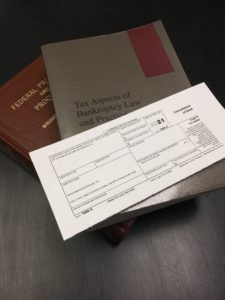Over the years, I’ve received plenty of calls from clients who received a Form 1099-C Cancellation of Debt from a creditor that was included in the client’s bankruptcy case. Obviously, the client is a bit concerned because the Form 1099-C says that the amount of the debt is being reported to the IRS.

So, if you receive a Form 1099-C after you’ve received a bankruptcy discharge, should you be worried? The short answer is,“No!” but there are a few steps you need to take.
To provide some context, normally, if a creditor cancels a debt over $600 outside of bankruptcy, the creditor reports the amount of cancelled debt to the IRS. The creditor sends one copy to the IRS and the other copy to the debtor. The form explains to the debtor that the cancelled debt can be attributed to the debtor as “income” for tax purposes.
The reasoning behind cancelled debt being construed as “income” follows like this. If a debtor obtains a $20,000, the debtor has to pay the loan back. However, if the creditor cancels the debt and it no longer must be paid, then the debtor has received a monetary benefit without any corresponding obligation to repay the $20,000 loan. The monetary benefit will be construed as “income” for tax purposes.
But, if a debt was discharged in a bankruptcy case, the creditor is not really cancelling the debt. When a bankruptcy court enters an order discharging the debt, the order really means that the creditor is prohibited from attempting to collect the debt. In that sense, a creditor really should not issue a Form 1099-C Cancellation of Debt when the debt was discharged through bankruptcy. Nevertheless, some creditors will issue the form anyway even through there is no basis to do so.
If you have received a bankruptcy discharge and you receive a Form 1099-C from a creditor, what should you do? Do not ignore it! There is a simple fix!
The Internal Revenue Code itself provides that debts discharged in a bankruptcy case do not count as “income”. 26 U.S.C. § 108. The IRS has also created a form to use if you receive a Form 1099-C related to a debt that was discharged in a bankruptcy case. Title 11 referenced on the form is the United States Bankruptcy Code. The form can be downloaded here.
If you receive a 1099-C, you should include that form with your tax filing along with a Form 982 with the box checked indicating that the debt was “Discharge of indebtedness under a Title 11 case” which is the Bankruptcy Code. It is helpful to include a copy of your bankruptcy discharge order as well. Submit these documents to the IRS along with your normal tax filing documents. Alternatively, submit these documents to your tax filing professional.
If these steps are followed, you are not likely to run into any difficulties.
